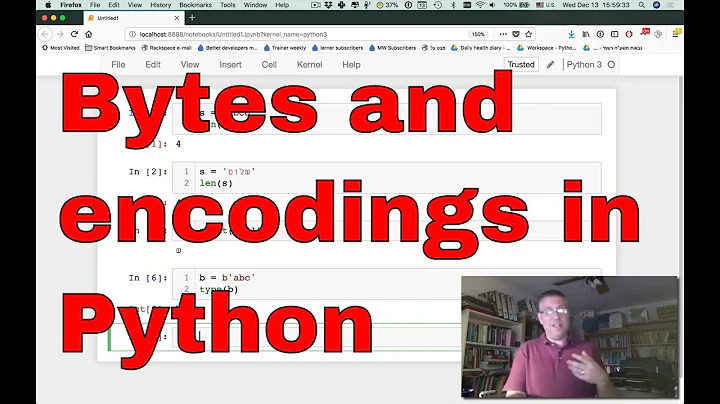How Does Ruby handle bytes/binary?
Solution 1
To make a string that has an arbitrary sequence of bytes, do something like this:
binary_string = "\xE5\xA5\xBD"
The "\x" is a special escape to encode an arbitrary byte from hex, so "\xE5" means byte 0xE5.
Then try sending that string on the socket.
Solution 2
Don't know if this helps enough, but you can index the bits in an integer in ruby.
n = 0b010101
n # => 21
n = 21
n[0] # => 1
n[1] # => 0
n[2] # => 1
n[3] # => 0
n[4] # => 1
n[5] # => 0
Solution 3
Have a look at the String.unpack method. This is an example:
str = "1010"
str.unpack("cccc")
=> [49, 48, 49, 48]
This will give you integer values. There are more ways to do the conversion.
Related videos on Youtube
Anikeev Gennadiy
I have to deal with a wide variety of different technologies, often ones I have no context for understanding, so I tend to post here a lot about a lot of different topics (Rails, Blackberry/Android development, SQL, OpenLayers, and Raphael are a few examples).
Updated on November 21, 2020Comments
-
Anikeev Gennadiy over 3 years
I'm trying to send a series of binary bytes across a socket, to meet a particular standard my company uses. No one in my company has used Ruby for this before, but in other languages, they send the data across one byte at a time, (usually with some sort of "pack" method).
I can't find anyway to create binary on the fly, or create bytes at all (the closest I can find it how you can turn a string into the bytes representing it's characters).
I know you can say something like :
@var = 0b101010101
But how would I convert a string in the form "101010101" or the resulting integer created when I do string.to_i(2) into an actual binary. If I just send the string accross a socket, won't that just send the ASCII for "0" and "1" instead of the literal characters?
Surely there is SOME way to do this natively in Ruby?
-
Anikeev Gennadiy almost 15 yearsBefore this post was edited, it told me about Array.pack. I don't quite understand this. If I have: @bob = ["111111111", "1000", "1111"] or whatever, and then I say: @bob.unpack(b*), it displays something like: "/377" Is that the correct binary? Isn't that only the first element of the array? How would I have it do the entire array?
-
NikolaDjokic almost 15 yearsArray.pack is the opposite of String.unpack. In your example bob.pack('b*') is only packing first element of array. You probably want bob.pack('bbb*'). However this is something different from what you are asking for in the question.
-
why over 12 yearsWhy there are some "/" in binary_string ?
-
David Grayson over 12 yearsIt's quite possible for a binary string to have a byte with value 0x2F (47). That's the ASCII encoding of "/" so if you
inspectthe string Ruby will usually print out a "/". The same thing goes for any ASCII character. Ruby doesn't actually know if your string is a "binary string", to Ruby your string is basically a sequence of bytes (except in 1.9 they added some encoding information). -
why over 12 yearsThanks! it helps me very much




![Binary Exploitation Talk [AR]](https://i.ytimg.com/vi/BDJNLVV2vHU/hqdefault.jpg?sqp=-oaymwEcCOADEI4CSFXyq4qpAw4IARUAAIhCGAFwAcABBg==&rs=AOn4CLBH_hDVzPyfHxulHt6Jz1hvqGFuEA)






